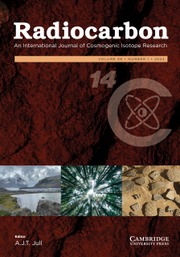Crossref Citations
This article has been cited by the following publications. This list is generated based on data provided by Crossref.
Godwin, H.
1969.
THE VALUE OF PLANT MATERIALS FOR RADIOCARBON DATING.
American Journal of Botany,
Vol. 56,
Issue. 7,
p.
723.
Lowdon, J. A.
1969.
Isotopic Fractionation in Corn.
Radiocarbon,
Vol. 11,
Issue. 2,
p.
391.
Bender, Margaret M.
Bryson, Reid A.
and
Baerreis, David A.
1969.
University of Wisconsin Radiocarbon Dates VI.
Radiocarbon,
Vol. 11,
Issue. 01,
p.
228.
Valastro, S.
and
Davis, E. Mott
1970.
University of Texas at Austin Radiocarbon Dates VII.
Radiocarbon,
Vol. 12,
Issue. 1,
p.
249.
Valastro, S.
and
Davis, E. Mott
1970.
University of Texas at Austin Radiocarbon Dates VIII.
Radiocarbon,
Vol. 12,
Issue. 2,
p.
617.
RAVEN, J. A.
1970.
EXOGENOUS INORGANIC CARBON SOURCES IN PLANT PHOTOSYNTHESIS.
Biological Reviews,
Vol. 45,
Issue. 2,
p.
167.
Bender, Margaret M.
Bryson, Reid A.
and
Baerreis, David A.
1970.
University of Wisconsin Radiocarbon Dates VII.
Radiocarbon,
Vol. 12,
Issue. 1,
p.
335.
Waterbolk, H. T.
1971.
Working with Radiocarbon Dates.
Proceedings of the Prehistoric Society,
Vol. 37,
Issue. 2,
p.
15.
Bender, Margaret M.
1971.
Variations in the 13C/12C ratios of plants in relation to the pathway of photosynthetic carbon dioxide fixation.
Phytochemistry,
Vol. 10,
Issue. 6,
p.
1239.
1971.
Photosynthesis, Photorespiration, and Plant Productivity.
p.
301.
Hendy, C.H
1971.
The isotopic geochemistry of speleothems—I. The calculation of the effects of different modes of formation on the isotopic composition of speleothems and their applicability as palaeoclimatic indicators.
Geochimica et Cosmochimica Acta,
Vol. 35,
Issue. 8,
p.
801.
Valastro, S.
Davis, E. Mott
and
Varela, Alejandra G.
1972.
University of Texas At Austin Radiocarbon Dates IX.
Radiocarbon,
Vol. 14,
Issue. 2,
p.
461.
Smith, Bruce N.
and
Brown, Walter V.
1973.
THE KRANZ SYNDROME IN THE GRAMINEAE AS INDICATED BY CARBON ISOTOPIC RATIOS.
American Journal of Botany,
Vol. 60,
Issue. 6,
p.
505.
Bender, Margaret M.
and
Smith, Dale
1973.
CLASSIFICATION OF STARCH‐ AND FRUCTOSAN‐ACCUMULATING GRASSES AS C‐3 OR C‐4 SPECIES BY CARBON ISOTOPE ANALYSIS.
Grass and Forage Science,
Vol. 28,
Issue. 2,
p.
97.
Rightmire, Craig T.
and
Hanshaw, Bruce B.
1973.
Relationship between the carbon isotope composition of soil CO2 and dissolved carbonate species in groundwater.
Water Resources Research,
Vol. 9,
Issue. 4,
p.
958.
Lerman, J. C.
and
Queiroz, O.
1974.
Carbon Fixation and Isotope Discrimination by a Crassulacean Plant: Dependence on the Photoperiod.
Science,
Vol. 183,
Issue. 4130,
p.
1207.
OLSSON, INGRID U.
and
OSADEBE, FRANCIS A. N.
1974.
Carbon isotope variations and fractionation corrections in 14C dating.
Boreas,
Vol. 3,
Issue. 4,
p.
139.
Deines, Peter
Langmuir, Donald
and
Harmon, Russell S.
1974.
Stable carbon isotope ratios and the existence of a gas phase in the evolution of carbonate ground waters.
Geochimica et Cosmochimica Acta,
Vol. 38,
Issue. 7,
p.
1147.
Valastro, S
Davis, E Mott
and
Varela, Alejandra G
1975.
University of Texas at Austin Radiocarbon Dates X.
Radiocarbon,
Vol. 17,
Issue. 1,
p.
52.
Troughton, John H.
and
Card, K. A.
1975.
Temperature effects on the carbon-isotope ratio of C3, C4 and crassulacean-acid-metabolism (CAM) plants.
Planta,
Vol. 123,
Issue. 2,
p.
185.

